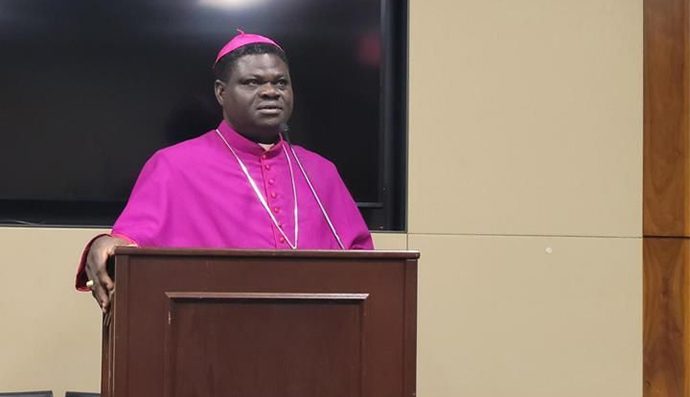U.S. Lawmakers Move to Sanction Nigerian Group Linked to Christian Massacres


U.S. Lawmakers Move to Sanction Nigerian Group Linked to Christian Massacres
The U.S. Congress is moving toward imposing sanctions, including visa bans and asset freezes, on leaders of Miyetti Allah Cattle Breeders Association of Nigeria (MACBAN) and Miyetti Allah Kautal Hore, citing credible evidence of their involvement in religiously motivated violence that has claimed thousands of Christian lives across Nigeria’s Middle Belt.
The move follows a resolution introduced by Rep. Christopher Smith of New Jersey and co-sponsored by Bill Huizenga (R-Mich.), Gus Bilirakis (R-Fla.) and Maria Elvira Salazar (R-Fla.). As of the latest publicly available release, no Democrats are listed as co-sponsors of the bill.
“President Trump acted appropriately and decisively to hold the Nigerian government accountable for its complicity in religious persecution by radical Islamists such as Boko Haram and Fulani terrorists,” Smith said while introducing the resolution.”
Resolution Cites Mass Killings, Church Burnings, and Clergy Threats

Bishop Wilfred Anagbe Credit: Catholic World Report.
The 15-page resolution lays bare the extent of violence in Nigeria’s Middle Belt, describing it as “a concerted effort for a Fulani-controlled empire modeled upon the caliphate established by Usman dan Fodio.”
According to the document, more than 56,000 Nigerians have been killed and 22,000 abducted by terrorist and militia groups between 2019 and 2023. The Observatory for Religious Freedom in Africa (ORFA) says Christians are killed at a rate nearly three times higher than Muslims, once population size is factored in. It also referenced data from Open Doors International, stating that Nigeria accounts for 89% of Christians martyred worldwide.
The resolution specifically names Bishop Wilfred Anagbe and Father Remigius Ihyula of Benue State, both of whom testified before the U.S. Congress in March 2025, describing how priests and Christian leaders have faced “intimidation, threats, and harassment from both extremists and government authorities.”
“We live under siege,” Bishop Anagbe serving as bishop of the Diocese of Makurdi told lawmakers in his testimony earlier this year. “Our people are slaughtered for their faith, and the government pretends it is a farmer-herder crisis.”
Targeted Sanctions Under the Global Magnitsky Act
The resolution urges the U.S. Departments of State and Treasury to invoke the Global Magnitsky Human Rights Accountability Act to impose sanctions on individuals or entities responsible for “severe violations of religious freedom,” including Miyetti Allah and other Fulani ethnic militias operating in Benue and Plateau States.
If adopted, members of these groups could face visa bans, asset freezes, and other restrictions designed to hold non-state actors accountable for atrocities committed under Nigeria’s climate of impunity.
The bill also calls for direct U.S. humanitarian assistance to faith-based organizations caring for millions of internally displaced persons (IDPs)in Nigeria’s north and Middle Belt regions, where Christian communities have been repeatedly attacked, villages razed, and farms occupied by armed herders.
A Turning Point in U.S.-Nigeria Relations
The congressional action marks a potential policy reversal from recent years, when successive U.S. administrations avoided labeling Nigeria as a country of concern, despite mounting reports of mass killings and abductions.
In 2021, 2022, and 2023, the U.S. State Department quietly omitted Nigeria from its CPC list, despite repeated recommendations by the U.S. Commission on International Religious Freedom (USCIRF). The new resolution asserts there was “no justification” for the omission and demands accountability for billions of dollars in U.S. assistance provided to Nigeria’s government despite its record on human rights.
“You cannot continue funding a government that looks away while thousands are killed,” Smith told reporters. “The victims are asking for justice, not pity.”
Human Cost and Nigerian Silence

From Agatu to Bassa, communities across the Middle Belt face relentless attacks. Analysts say Abuja’s refusal to name Fulani-linked militias as terrorists has only emboldened the killers.
Reverend Father Remigius Ihyula, a Catholic priest who earlier spoke to TruthNigeria, warned the humanitarian crisis was worsening: “This isn’t random violence; it’s a coordinated campaign to permanently displace Christians from their ancestral lands. These Fulani militias are not just killing; they’re clearing land to claim it. And they’re being allowed to do it.”
Despite mounting evidence, Nigeria’s federal authorities deny religious persecution, insisting the violence is “communal” or “farmer-herder clashes.” The U.S. resolution dismisses that argument as inconsistent with “readily discernable evidence.”
What Happens Next
If passed, the resolution could redefine Washington’s diplomatic posture toward Africa’s largest democracy. It would also signal to Nigeria’s government and militant groups that religious freedom is now central to U.S.-Nigeria relations.
For millions of displaced Christians, however, the sanctions represent more than politics, they are a long-awaited acknowledgment of their suffering.
“Our leaders travel abroad while we bury our families,” said Solomon Iliya, a university student displaced from Plateau State who spoke to mytrendcaster. “If America bans them from getting visas, maybe they’ll finally feel a small part of the pain we live with every day.”
“Sanctions are not an insult, they’re a wake-up call,” he added. “The world is telling Abuja to stop hiding behind excuses. You cannot preach unity while protecting killers.”












